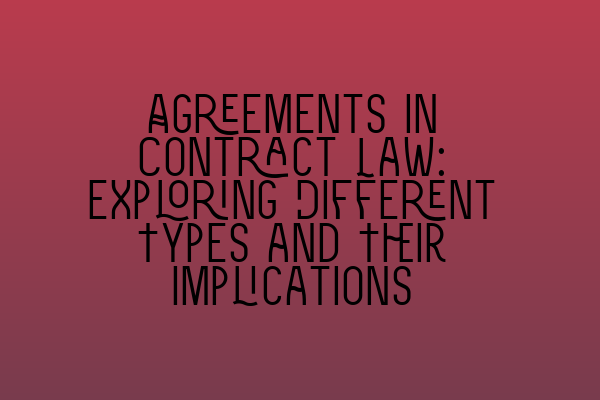In contract law, agreements play a vital role in defining the rights and obligations of parties involved. These agreements, often referred to as contracts, establish a binding legal relationship and provide clarity on the terms and conditions of a business transaction or any other exchange of goods, services, or money.
Understanding the different types of agreements in contract law is crucial for both solicitors and their clients. From verbal agreements to written contracts, each type has its own implications and legal consequences. In this article, we will explore various types of agreements and shed light on their significance.
Verbal Agreements
Verbal agreements, also known as oral agreements, are simple agreements that are made through verbal communication, without any formal documentation. While these agreements can be legally binding, they are often open to misinterpretation and disputes due to the absence of written evidence. It is always recommended to have written documentation for important agreements to avoid any potential misunderstandings or conflicts in the future.
For more information on the pitfalls of verbal agreements, check out this article on legal challenges and pitfalls.
Written Contracts
A written contract is a formal agreement that is documented in writing and signed by the parties involved. These contracts provide greater clarity and certainty, as they outline the terms and conditions in detail, including the obligations, responsibilities, and rights of each party. They serve as strong evidence in case of disputes and can be enforced by courts if necessary.
While written contracts provide a higher level of protection, it is essential to ensure that both parties fully understand and agree to the terms before signing. Seeking legal advice from a solicitor can help avoid any potential loopholes or unfair clauses.
Implied Agreements
Implied agreements are agreements that are not explicitly stated, but are inferred from the conduct or circumstances of the parties involved. These agreements are based on the principle of fairness and are often implied by law or custom. For example, when you enter a shop and purchase a product, there is an implied agreement that the product is fit for its intended purpose.
An understanding of implied agreements is essential, as they can affect the rights and obligations of the parties involved, even if there is no explicit written or verbal agreement.
Unilateral Agreements
A unilateral agreement is an agreement where one party makes a promise or offers a reward in exchange for the performance of a specific act by the other party. In these agreements, only one party is legally obligated to fulfill their promise or offer, while the other party has the option to accept or decline the offer.
These agreements often arise in scenarios such as reward offers or performance-based contracts. It is crucial to clearly define the terms of the offer and the conditions for acceptance to ensure a valid unilateral agreement.
Mentorship for Aspiring Solicitors: Nurturing Talent in the Legal Field
If you aspire to become a solicitor, mentorship can greatly enhance your journey. Check out this article on mentorship for aspiring solicitors to gain more insight into the importance of mentoring in the legal field.
Demystifying the Solicitors Qualifying Examination (SQE): What You Need to Know
For those pursuing a career in law, understanding the Solicitors Qualifying Examination (SQE) is crucial. Get a comprehensive overview of the SQE and what it entails in this article on demystifying the SQE.
Conclusion
Agreements in contract law are the foundation of legal relationships. Whether verbal or written, they define the terms, rights, and obligations of the parties involved. Understanding the different types of agreements and their implications is essential for solicitors to advise their clients effectively and ensure that their rights are protected. Seek legal guidance when entering into any agreement to ensure that your rights and interests are safeguarded.
For further reading on alternative dispute resolution, which can help resolve legal conflicts outside courtrooms, take a look at our article on exploring alternative dispute resolution.
Remember, contracts are legally binding documents, so it’s crucial to approach them with care and seek professional advice when needed.
